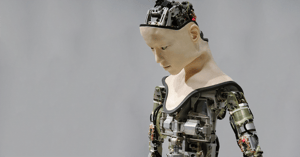Five Distinctly Human Characteristics
There’s been a lot of speculation lately on whether advances in artificial intelligence will result in machines that are so much like us that we might as well consider them human. Well, it’s a far cry from winning games of Go against world champions, composing sonnets in the style of William Shakespeare, or even writing code to being truly human. The following five distinctively human characteristics summarize the great distance between us and machines.
1. Self-awareness
Humans possess a unique level of self-awareness, which includes the ability to understand ourselves as individuals, including our own thoughts and emotions. This self-awareness also enables us to reflect on our actions and make conscious decisions.
2. Emotional Intelligence and Empathy
Humans have the ability to understand and manage their own emotions and those of others. This emotional intelligence allows us to form strong social bonds, navigate complex social interactions, and empathize with others.
3. Morality and Ethics
Humans have a sense of right and wrong and a moral code that guides our actions. This moral code is shaped by cultural and societal norms and can vary between groups.
4. Creativity and Imagination
Humans possess a unique ability to create new ideas, think outside the box, and imagine new possibilities. This creativity and imagination is what drives innovation and progress in fields such as art, science, and technology.
5. Social Organization and Cooperation
Humans have the ability to organize themselves in complex social structures and cooperate with one another to achieve common goals. This ability allows for the development of communities and nations.
Will Future AI Close the Gap?
Now that we’ve looked at some distinctly human features, it's time for me to confess that the list was written by ChatGPT, OpenAI’s large language model (LLM), that is trained on a wide range of internet content to generate human-like text. I must also admit that I asked ChatGPT for ten distinctive features, but many of them, such as language, use of tools, and art, have already been achieved (at least partially) by artificial intelligence; thus, I reduced the list to only five features.
In the future artificial intelligence will likely exhibit features 2–5 in a convincing manner, but feature number 1, self-awareness, or what philosopher David Chalmers has labeled the hard problem of consciousness, is the show-stopper for AI. The other items can be achieved by mimicking conscious thought and behavior, but with self-awareness you either have it or you don’t. You’re either aware of yourself as a thinker, feeler, and actor or you're not. We all have firsthand experience of self-awareness but its cause is a mystery. You need something other than algorithms, massive amounts of data, and processing speed for self-awareness. This is the premise of physicist Roger Penrose in his books, The Emperor's New Mind and Shadows of the Mind.
AI Opportunities and Risks
Leaving the AI versus human intelligence controversy aside, AI's future looks more exciting and transformative than anything we’ve seen yet in the digital age. With that power comes opportunities and risks. I asked ChatGPT for a summary of those. Here is its response:
“Artificial intelligence (AI) has many potential opportunities such as increased efficiency and productivity, improved healthcare, better decision-making, and new job opportunities. However, it also poses risks such as job displacement, bias and discrimination, security and privacy risks, ethical concerns and lack of understanding. It is important to be aware of these potential risks and to take steps to mitigate them as the technology progresses in order to harness the potential benefits of AI.”
You can get the free trial version of ChatGPT by clicking on the link at the top of OpenAI’s homepage.
